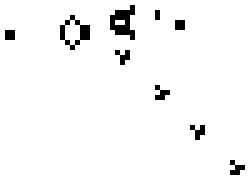And I have to start this essay with a simple statement that it is not lost on me that all of the above is 100% derived from my own history, studies, jobs, art works, and everything else that goes into me. So maybe this is just a theory of myself or not even a theory, but yet another expression in a life time of expressions. At the very least I enjoyed 20 hrs of re-reading some great science, crafting what I think is a pretty neat piece of art work, and then summarizing some pondering. Then again, maybe I’ve made strides on some general abstract level. In either case, it’s just another contingent reconfiguration of things.
At the end I present all the resources I read and consulted during the writing (but not editing) and the making of the embedded 19×24 inch drawing and ink painting (which has most of this essay written and drawn into it). I drank 4 cups of coffee over 5 hrs, had 3 tacos and 6 hotwings during this process. Additionally I listened to “The Essential Philip Glass” while sometimes watching the movie “The Devil Wears Prada” and the latest SNL episode.
——————-
There is a core problem with all theories and theory at large – they are not The t=Truth and do not interact in the universe like the thing they refer to. Theories are things unto themselves. They are tools to help craft additional theories and to spur on revised dabbling in the world.
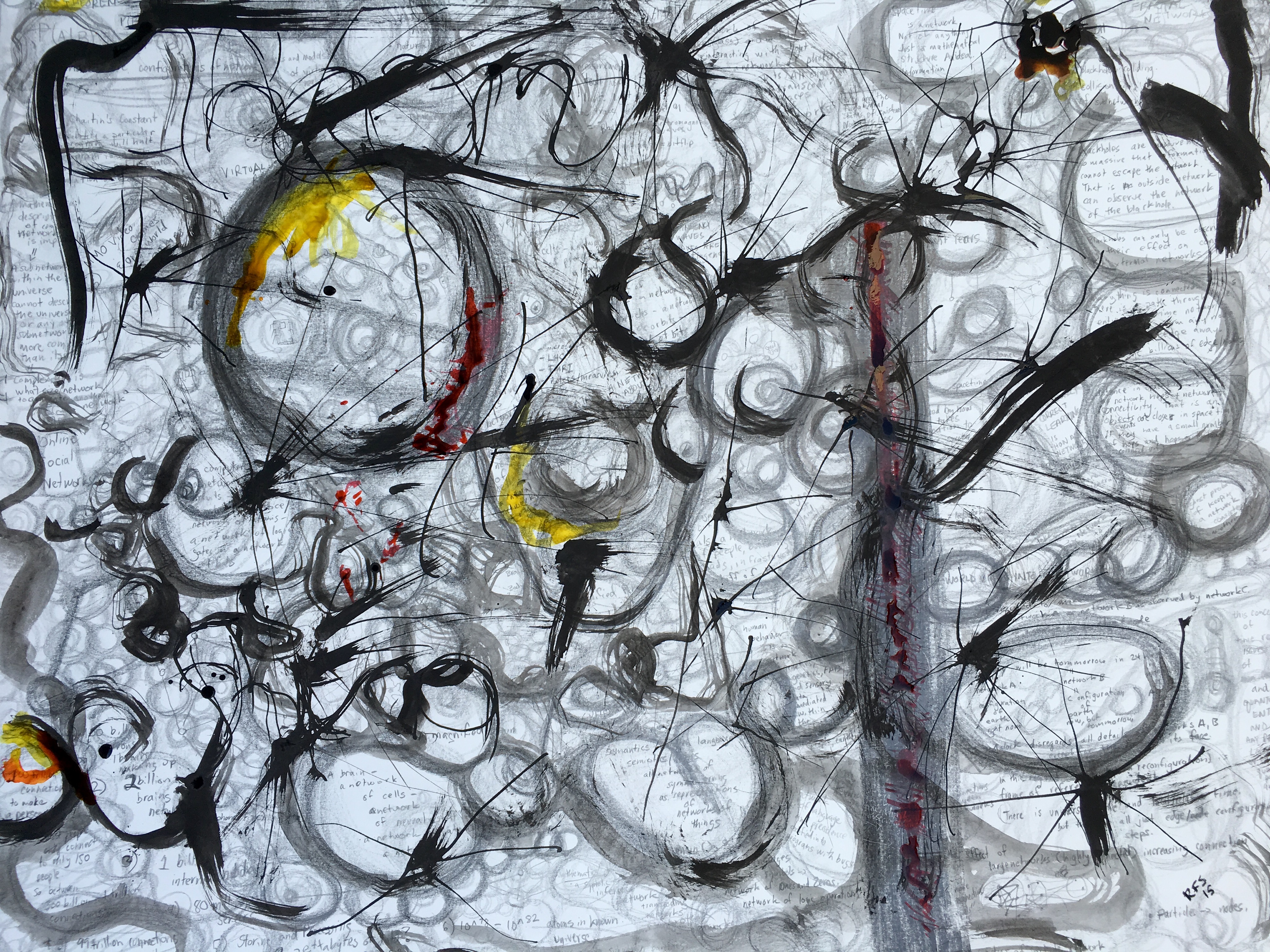
We have concocted an unbelievable account of reality across religious, business, mathematical, political and scientific categories. Immense stretches of imagination are required to connect the dots between the category theory of mathematics to radical behaviorism of psychology to machine learning in computer science to gravitational waves in cosmology to color theory in art. The theories themselves have no easy bridge – logical, spiritual or even syntactically.
Furthering the challenge is the lack of coherence and interoperability of measurement and crafting tools. We have forever had the challenge of information exchange between our engineered systems. Even our most finely crafted gadgets and computers still suffer from data exchange corruption. Even when we seem to find some useful notion about the world it is very difficult for us to transmit that notion across mediums, toolsets and brains.
And yet, therein lies the the reveal!
A simple, yet imaginative re-think provides immense power. Consider everything as network. Literally the simplest concept of a network – a set of nodes connected by edges. Consider everything as part of a network, a subnetwork of the universe. All subnetworks are connected more or less to the other subnetworks. From massive stars to a single boson, all nodes in a network and those networks of networks. Our theories are networks of language, logic, inference, experiment, context. Our tools are just networks of metals, atoms, and light. It’s not easy to replace your database of notions reinforced over the years with this simple idea.
But really ask yourself why that is so hard but you can believe that blackholes collide and send out gravitational waves that slightly wobble spacetime 1.3 billion light years away or if you believe in the Christian God, consider how that’s believable and that woman was created from a guy named Adam’s rib. It’s all a bit far fetched but we buy these other explanations because the large network of culture and tradition and language and semiotics has built our brains/worldviews up this way.
Long ago we learned that our senses are clever biological interpreters of internal and external context. Our eyes do not see most of “reality” – just a pretty course (30 frames per second) and small chunk of electromagnetic waves (visible light). in the 1930s we learned that even mathematics itself and the computers we’d eventually construct can not prove many of the claims they will make, we just have to accept those claims. (incompleteness and halting problem.).
These are not flaws in our current understanding or current abilities. These are fundamental features of reality – any reality at all. In fact, without this incompleteness and clever loose interpretations of information between networks there would be no reality at all – no existence. This is a claim to return to later.
In all theories at the core we are always left with uncertainty and probability statements. We cannot state or refer to anything for certain, we can only claim some confidence that what we’re claiming or observing might, more or less, be a real effect or relation. Even in mathematics with some of the simplest theorems and their logical proofs we must assume axioms we cannot prove – and while that’s an immensely useful trick it certainly doesn’t imply that any of the axioms are actually true and refer to anything that is true or real.
The notion of probability and uncertainty is no easy subject either. Probability is a measure of what? It is a measure belief (Bayes) that something will happen given something else? Is it a measure of lack of information – this claim is only X% of the information? Is it a measure of complexity?
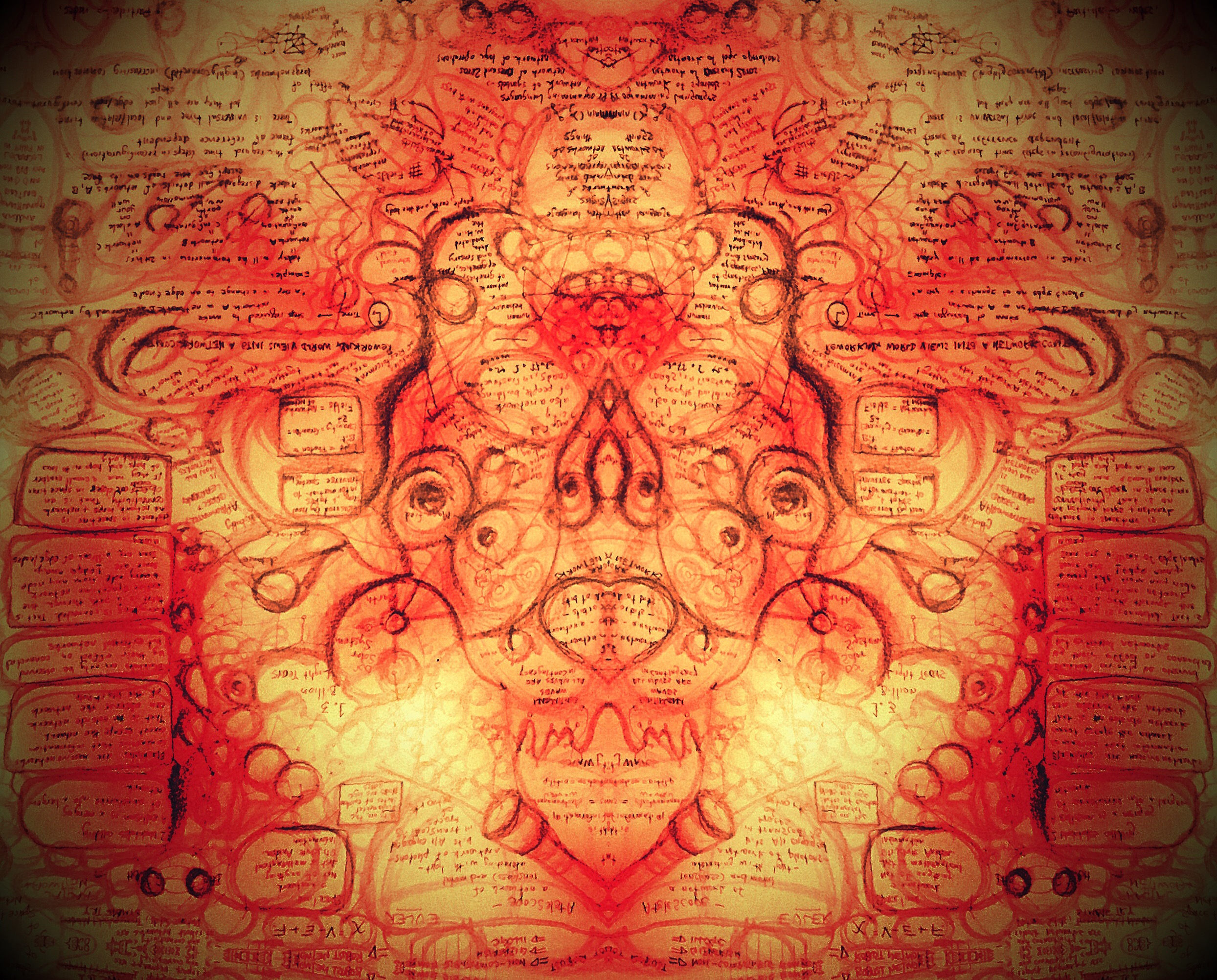
Again, the notion of networks is incredibly helpful. Probability is a measure of contingency. Contingency, defined and used here, is a notion of connectivity of a network and nodes within the network. There need be no hard and fast assignment of the unit of contingency – different measures are useful and instructive for different applications. There’s a basic notion at the heart of all of them: contingency is a cost function of going from a configuration to another configuration of the network.
And that leads to another startling idea. Spacetime itself is just a network. (obvious intuition from my previous statement) and everything is really just a spacetime network. Time is not the ticks on a clock nor an arrow marching forward. Time is nothing but a measure of steps to reconfigure a network from state A to some state B. Reconfiguration steps are not done in time, they are time itself.
(most of my initial thinking comes from Wolfram and others working on this long before my thinking about it: http://blog.stephenwolfram.com/2015/12/what-is-spacetime-really/ – Wolfram and others have done a ton of heavy lifting to translate the accepted theories and math into network terms).
This re-framing of everything into network thinking requires a huge amount of translation of notions of waves, light, gravity, mass, fields, etc into network conventions. While attempting to do that in blog form is fun and I’ve attempted to keep doing it, the reality of the task is that no amount of writing about this stuff will make a sufficient proof or even useful explanation of the idea to people.
Luckily, it occurred to me (a contingent network myself!) that everyone is already doing this translation and even more startling it couldn’t go any other way. Our values and traditions started to be codified into explicit networks with the advent of written law and various cultural institutions like religion and formal education. Our communities have now been codified into networks by online social networks. Our location and travels have been codified by GPS satellites and online mapping services. Our theories and knowledge are being codified into Wikis, Programs (Wolfram Alpha, Google Graph, Deep Learning networks, etc). Our physical interpretations of the world have been codified into fine arts, pop arts, movies and now virtual and augmented realities. Our inner events/context are being codified by wearable technologies. And now the cosmos has unlocked gravitational waves for us so even the mystery of black holes and dark matter will start being codified into knowledge systems.
It’s worth a few thoughts about Light, Gravity, Forces, Fields, Behavior, Computation.
- Light (electromagnetic wave-particles) is the subnetwork encoding the total configurations of the entire universe and every subnetwork.
- Gravity (and gravitational wave-particles) is the subnetwork of how all the subnetworks over a certain contingency level (mass) are connected.
- Other 3 fundamental Forces (electromagnetics, weak nuclear, strong nuclear) are also just subnetworks encoding how all subatomic particles are connected.
- Field is just another term for network, hardly worth a mention.
- Behavior observations are partially encoded subnetworks of the connections between subnetworks. They do not encode the entirety of a connection except for the smallest, most simple networks.
- Computation is time is the instruction set is a network encoding how to transform one subnetwork to another subnetwork.
These re-framed concepts allow us to move across phenomenal categories and up and down levels of scale and measurement fidelity. They open up improved ways of connecting the dots between cross-category experiments and theories. Consider radical behaviorism and schedules of reinforcement combined with the Probably Approximately Correct learning theory in computer science against a notion of light and gravity and contingency as defined above.
What we find is that learning and behavior based on schedules of reinforcement is actually the only way a subnetwork (say, a person) and a network of subnetworks (a community) could encode the vast contingent network (internal and external environments, etc). Some schedules of reinforcement maintain responses better than others, and again here we find the explanation. Consider a Variable Ratio schedule reinforcing a network. (see here for more details: https://en.wikipedia.org/wiki/Reinforcement#Intermittent_reinforcement.3B_schedules). A variable ratio (a variations/compositions on this) schedule is a richer contingent network itself that say a fixed ratio network. That is, as a network encoding information between networks (essentially a computer program and data) the variable ratio has more algorithmic content to keep associations linked after many related network configurations.
Not surprisingly this is exactly the notion of gravity explained above. Richer, more complex networks with richer connections to other subnetworks have much more gravity – that is they attract more subnetworks to connect. They literally curve spacetime.
To add another wrinkle in theory, it has been observed in a variety of categories that the universe seems to prefer computational efficiency. Nearly all scientific disciplines from linguistics to evolutionary biology to physics to chemistry to logic end up with some basic notion of “Path of Least Effort” (https://en.wikipedia.org/wiki/Principle_of_least_effort). In the space of all possible contingent situations networks tend to connect in the computationally most efficient way – they encode each other efficiently. That is not to say it happens that way all the time. In fact, this idea led me to thinking that while all configurations of subnetworks exist, the most commonly observed ones (I use a term: robust) are the efficient configurations. I postulate this explains mathematical constructs such as the Platonic solids and transcendental numbers and likely the physic constants. That is, in the space of all possible things, the mean of the distribution of robust things are the mathematical abstractions. While we rarely experience a perfect circle, we experience many variations on robust circular things… and right now the middle of them is the perfect circle.
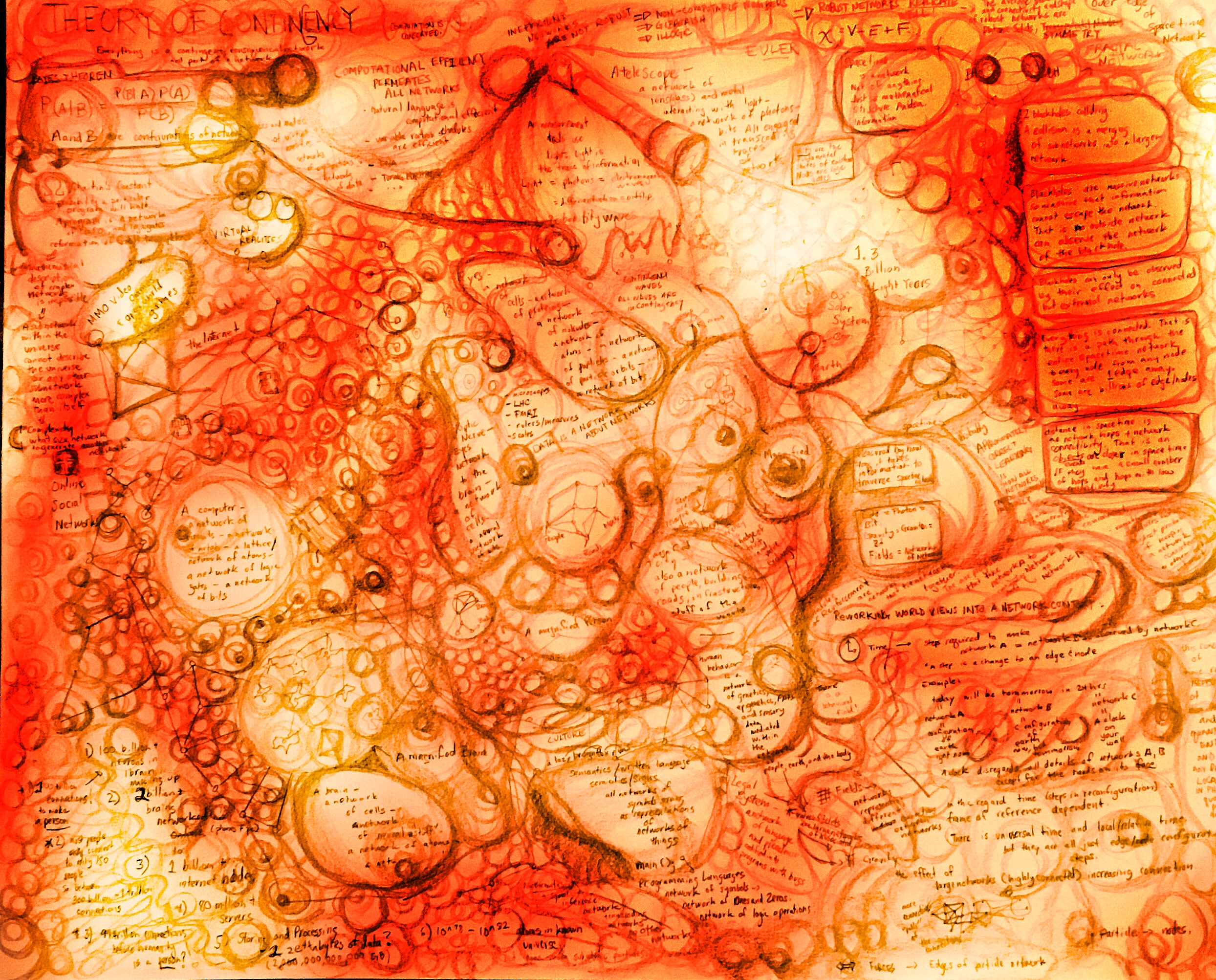
Now, what is probably the most bizarre idea of all: nothing is actually happening at the level of the universe nor at the level of a photon. The universe just is. A photon, which is just a single massless node, everything happens to it all at once, so nothing happens.
That’s right, despite all the words and definitions above with all the connotations of behavior and movement and spacetime… experience and happening and events and steps and reconfigurations are actually just illusions, in a sense, of subnetworks describing other subnetworks. The totality of the universe includes every possible reconfiguration of the universe – which obviously includes all theories, all explanations, all logics, all computations, all behavior, all schedules in a cross product of each other. No subnetwork is doing anything at all, it simply IS and is that subnetwork within the specific configuration of universe as part of the wider set of the whole.
This sounds CRAZY. until you look back on the history of ideas, this notion has come up over and over regardless of the starting point, the condition of the observational tools, the fads of language and business of the day. It is even observable in how so many systems “develop” first as “concrete” physical, sensory things… they end up yielding time and time again to what we call the virtual – strangely looping recursive networks. Here I am not contradicting myself, instead… this is what exists within the fractal nature of the universe (multiverse!) it is self similar all the way up and down scales and across all configurations (histories).
Theories tend to be ignored unless they are useful. I cannot claim utility for everyone on this theory. I do find it helpful for myself in moving between disciplines and not getting trapped in syntactical problems. I find confirmation of my own cognitive bias in the fact that the technology of loosely connecting the dots like GPS, hyperlinks, search engine, social media, citation analysis, Bayes, and now deep learning/PAC have yielded tremendous expansion of information and re-imaging of the world.
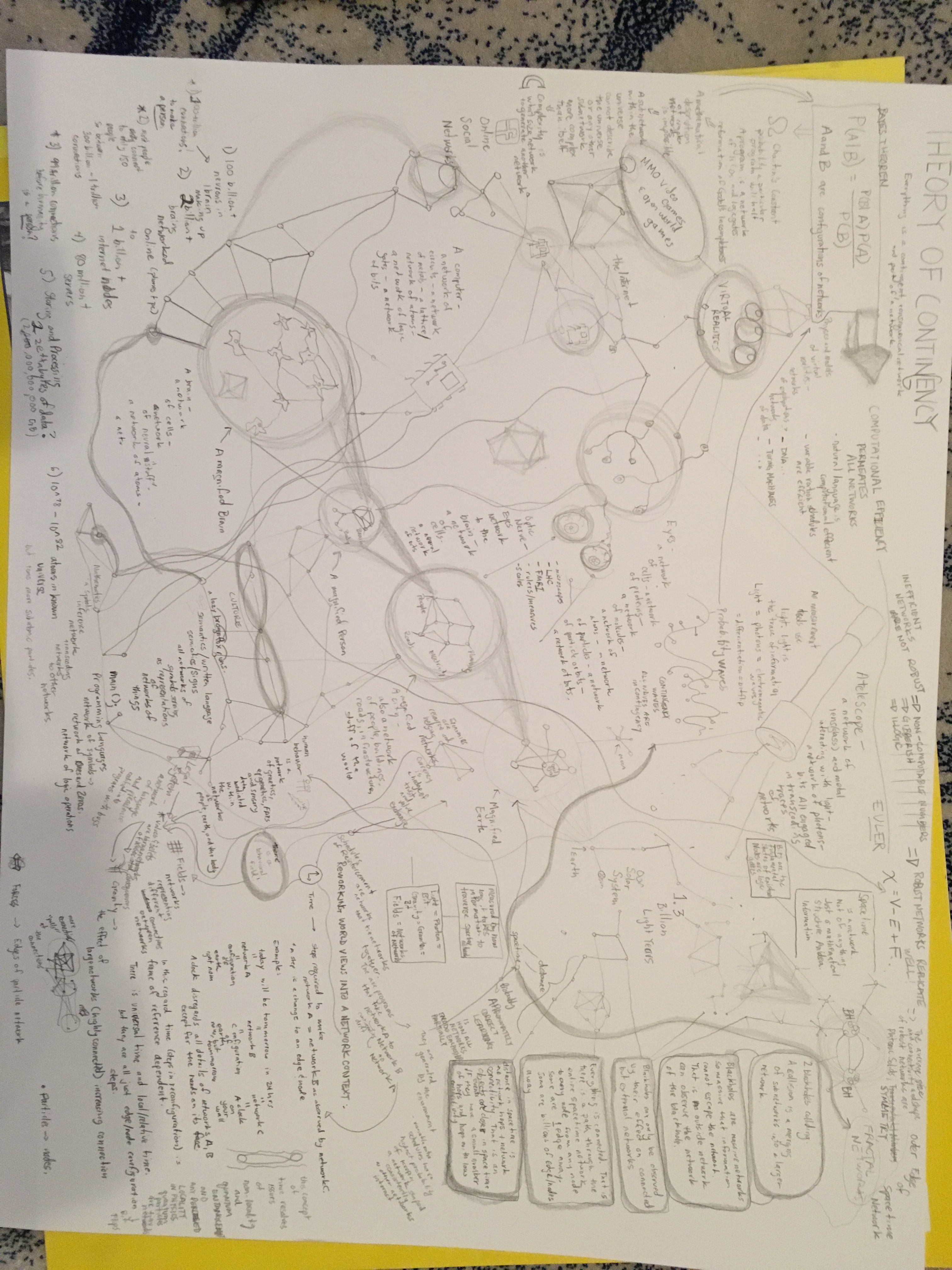
Currency, writing, art, music are not concrete physical needs and yet they mediate our labor, property, government, nation states. Even things we consider “concrete” like food and water are just encodings of various configurations. Food can be redefined in many ways and has been over the eons as our abstracted associations drift. Water seems like a concrete requirement for us, but us is under constant redefinition. Should people succeed in creating human-like (however you define it) in computers or the Internet it’s not clear water would be any more concrete than solar power, etc.
Then again, if I believe anything I’ve said above, it all already exists and always has.
———————————–
Chaitin on Algorithmic Information, just a math of networks.
https://www.cs.auckland.ac.nz/~chaitin/sciamer3.html
Platonic solids are just networks
https://en.m.wikipedia.org/wiki/Platonic_solid#Liquid_crystals_with_symmetries_of_Platonic_solids
Real World Fractal Networks
https://en.m.wikipedia.org/wiki/Fractal_dimension_on_networks#Real-world_fractal_networks
Correlation for Network Connectivity Measures
http://www.ncbi.nlm.nih.gov/pubmed/22343126
Various Measurements in Transport Networks (Networks in general)
https://people.hofstra.edu/geotrans/eng/methods/ch1m3en.html
Brownian Motion, the network of particles
https://en.m.wikipedia.org/wiki/Brownian_motion
Semantic Networks
https://en.wikipedia.org/wiki/Semantic_network
MPR
https://en.m.wikipedia.org/wiki/Mathematical_principles_of_reinforcement
Probably Approximately Correct
https://en.m.wikipedia.org/wiki/Probably_approximately_correct_learning
Probability Waves
http://www.physicsoftheuniverse.com/topics_quantum_probability.html
Bayes Theorem
https://en.m.wikipedia.org/wiki/Bayes%27_theorem
Wave
https://en.m.wikipedia.org/wiki/Wave
Locality of physics
http://www.theatlantic.com/science/archive/2016/02/all-physics-is-local/462480/
Complexity in economics
http://www.abigaildevereaux.com/?p=9%3Futm_source%3Dshare_buttons&utm_medium=social_media&utm_campaign=social_share
Particles
https://en.m.wikipedia.org/wiki/Graviton
Gravity is not a network phenomenon?
https://www.technologyreview.com/s/425220/experiments-show-gravity-is-not-an-emergent-phenomenon/
Gravity is a network phenomenon?
https://www.wolframscience.com/nksonline/section-9.15
Useful reframing/rethinking Gravity
http://www2.lbl.gov/Science-Articles/Archive/multi-d-universe.html
Social networks and fields
https://www.researchgate.net/profile/Wendy_Bottero/publication/239520882_Bottero_W._and_Crossley_N._(2011)_Worlds_fields_and_networks_Becker_Bourdieu_and_the_structures_of_social_relations_Cultural_Sociology_5(1)_99-119._DOI_10.11771749975510389726/links/0c96051c07d82ca740000000.pdf
Cause and effect
https://aeon.co/essays/could-we-explain-the-world-without-cause-and-effect
Human Decision Making with Concrete and Abstract Rewards
http://www.sciencedirect.com/science/article/pii/S1090513815001063
The Internet
http://motherboard.vice.com/blog/this-is-most-detailed-picture-internet-ever




